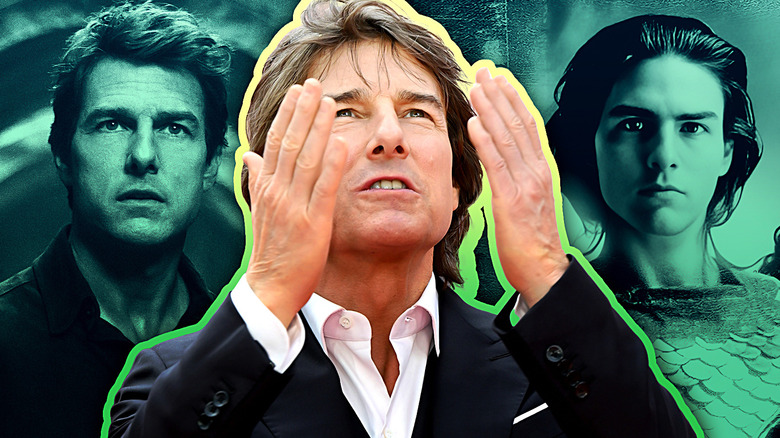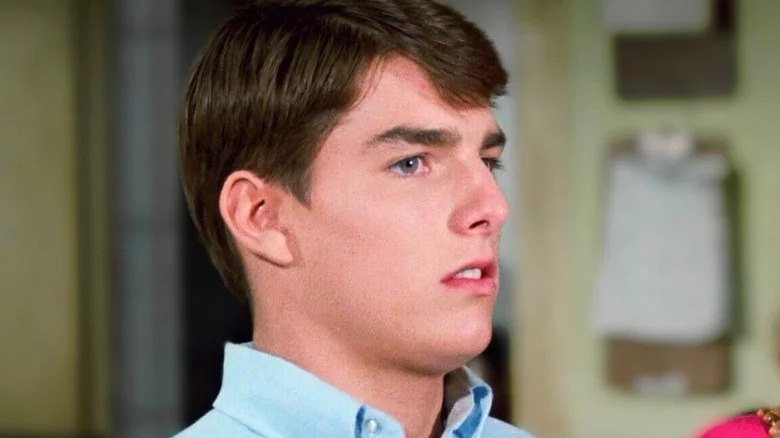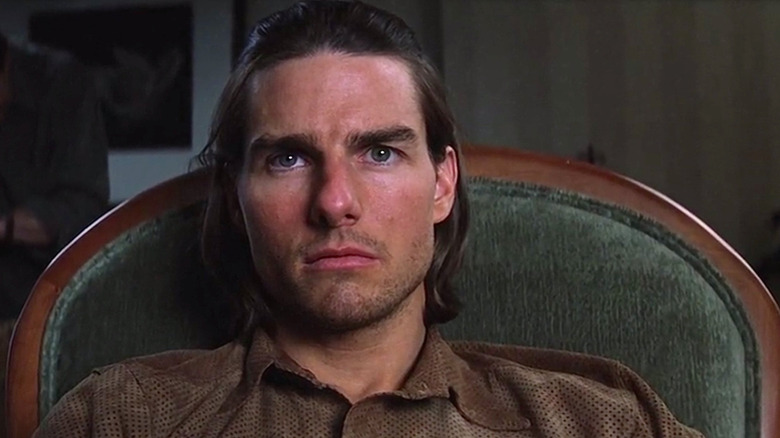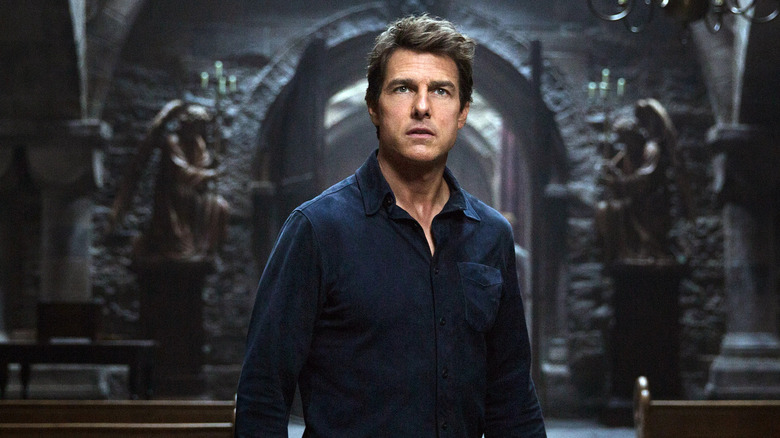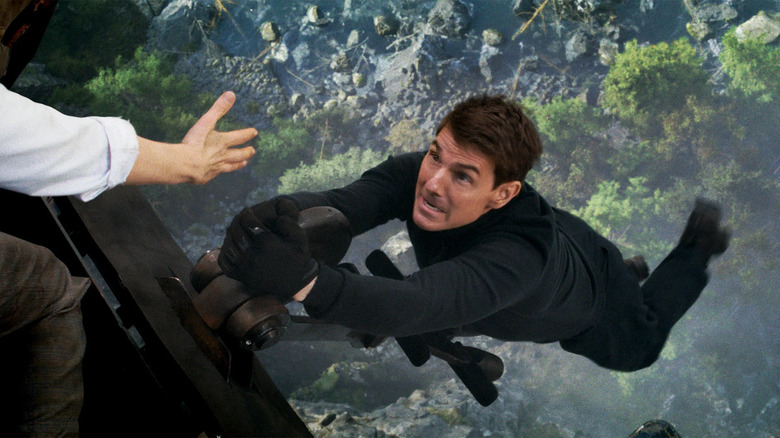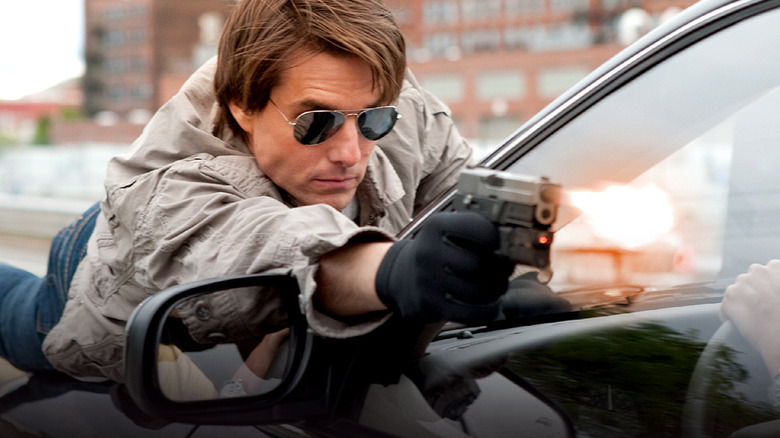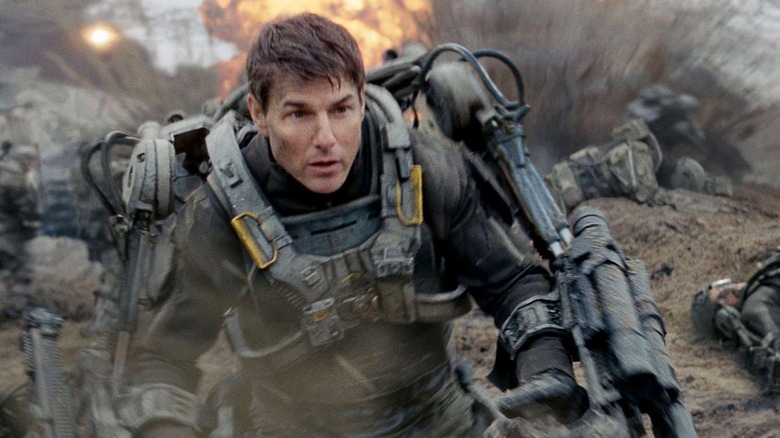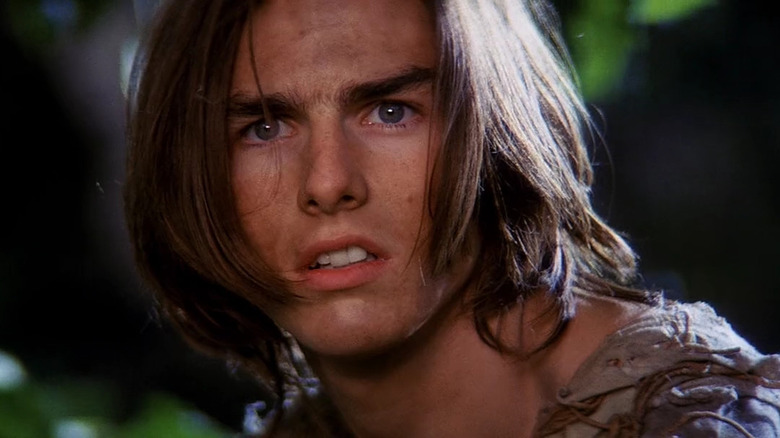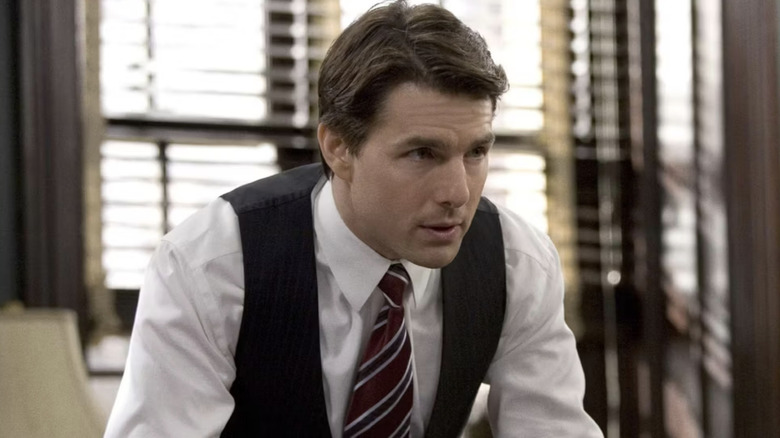Why These Tom Cruise Movies Flopped
After more than four decades in Hollywood, Tom Cruise remains one of the town's biggest names. Getting his start in the early 1980s, Cruise became an A-lister thanks to "Top Gun" in 1986 and has never looked back. He's the rare megastar to remain at the top of his industry for over 40 years, and with a reputation for delivering hits: Whether it's an over-the-top action blockbuster or a heartfelt drama, movie-goers know they'll get something good when Cruise is headlining a film. And most of his movies have found big box office success as a result.
A deeper dive, however, reveals a surprising amount of Tom Cruise flicks that failed, if not outright flopped. Not all of them necessarily fit most people's idea of a box office bomb, though. As a general rule of thumb, a movie needs to earn roughly double its production budget — to account for the theater owners' portion of the ticket sales as well as promotions and marketing — to be a hit. So some of Cruise's movies sold a lot of tickets, but still lost money due to an outsized budget. Still others were able to break even but didn't come close to delivering a decent profit for the studio. So why did these movies fail? We've looked behind the numbers to find out.
Losin' It
It might not have been his debut film, but the 1982 comedy "Losin' It" was Tom Cruise's first time leading a movie. Directed by Curtis Hanson — who later helmed such classics as "The Hand That Rocks the Cradle," "L.A. Confidential," and "8 Mile" — this mostly-forgotten teen sex romp didn't have any big names that audiences could latch onto. It also happens to be among Cruise's absolute worst films — one of the few, in fact, that he probably wants you to forget about.
A story about a group of unlucky teens out to lose their virginity, "Losin' It" sees Cruise in the role of an inept, socially awkward teenager named Woody (do you get it? It's a sex comedy!). While on a road trip to Mexico to find some lovin', Woody and his friends run into a frustrated older woman (Shelley Long) who's become jaded by marriage and is headed south for a divorce. Madcap sex silliness ensues, and while it's tempting to think that it flopped because it was a lowbrow laugher, plenty of similar movies at the time turned a solid profit or at least earned some decent money, whether it was "Zapped!," "Revenge of the Nerds," or "Casual Sex?"
No, the real reason that "Losin' It" flopped is that even among '80s teen sex comedies it stands out among the worst. And it seems that the studio knew it had a dud on its hands because they only gave the film a limited release in 180 theaters, where it only gathered about a million dollars in ticket sales.
Magnolia
Tom Cruise was an A-list action star during the late '80s, while in the '90s he branched out into more mature, serious dramas like "The Firm" and "A Few Good Men." Around the turn of the millennium, though, Cruise entered his experimental phase, starring in films that you might not have expected from him prior, like Stanley Kubrick's "Eyes Wide Shut" and the mind-bending thriller "Vanilla Sky." Right in the middle of this era came "Magnolia," from director Paul Thomas Anderson, the 11-time Oscar nominee widely recognized as one of the best directors of his day.
A masterclass in filmmaking, "Magnolia" received glowing reviews from both critics and audiences who praised its stylish direction, fine cast, and sheer ambition. Unfortunately, it couldn't muster up enough at the box office to make it a hit, and there are a few reasons audiences didn't lap it up like they did "Mission: Impossible" a few years earlier.
For starters, audiences had grown accustomed to Tom Cruise as a bold, powerful superstar, but his performance in "Magnolia" is more nuanced and understated. It totally works, and it may be one of his most underrated roles, even earning Cruise his third Oscar nomination as an actor. But movie-goers may have been thrown off, seeking something with a bit more action and excitement. Toss in the more arthouse marketing, and it's no wonder that fans of Tom Cruise weren't exactly flocking to theaters. Ultimately, it couldn't break even despite its relatively small budget, earning just $48 million at the ticket counter against a $37 million expenditure.
The Mummy
When talking Tom Cruise flops, "The Mummy" might be the first movie that jumps to mind — not just because it was a huge disappointment financially, but because its failure killed off an entire franchise in the making. One of many infamous cinematic universes to fail miserably, the so-called "Dark Universe" planned to unite new versions of Universal's classic movie monsters, with Russell Crowe, Johnny Depp, Cruise, and Javier Bardem leading their respective films.
In the 2017 reboot "The Mummy," Cruise stars as a mercenary relic hunter who stumbles across an ancient evil that has returned after thousands of years. The total financial outlay for the project came in well north of $300 million, including production and marketing, which made it impossible for the film to make money after it stalled with box office earnings of $410 million. So what went wrong?
In addition to a bungled promotional campaign, the film tried to become a Tom Cruise action thriller rather than a classic monster movie and just didn't work. The movie was deemed downright awful — it sits at a dreadful 15% on Rotten Tomatoes — which led to poor word of mouth. Then there's its poorly-timed release, opening after the fifth "Pirates of the Caribbean" and "Wonder Woman" in the weeks prior, followed by a "Transformers" film two weeks later. All together, it's no surprise that the studio scrapped every spin-off and sequel, squashing the "Dark Universe" in favor of smaller-scale, lower-budget relaunches, starting with "The Invisible Man" starring Elisabeth Moss and the upcoming "Dracula" reboot.
Mission: Impossible -- Dead Reckoning Part One
It's difficult to imagine a "Mission: Impossible" film flopping at the box office, or even with critics. The first film in the series was a massive blockbuster, particularly for the mid-'90s, and almost each film that followed saw better ticket sales than the last, either globally or domestically. "Mission: Impossible — Fallout" hit the franchise high mark with a $786 million global cume. "Mission: Impossible — Dead Reckoning Part One" followed, so it's safe to say that the studio probably had billion-dollar hopes.
Those hopes were dashed, however, thanks in part to the COVID-19 pandemic, which was still raging in 2021 when filming on "Dead Reckoning" got underway. The production saw numerous starts and stops, with the frequent delays and added safety protocols helping to balloon the budget to an eye-popping $291 million. At that level, it would have needed over $600 million just to break even. To make matter worse, "Oppenheimer" and "Barbie" came along one week after the movie's mid-July release. Those two films combined for a mind-blowing $244 million on their shared opening weekend, kicking "Dead Reckoning" to a distant third.
Make no mistake, "Mission: Impossible — Dead Reckoning Part One" is a great film that lives up to its predecessors, and reviews reflected that. Word of mouth was strong, audiences ate the movie up, but its budget and its poorly-timed release date doomed the film's chances of cracking that elusive billion-dollar mark. Worse still, industry analysts believe that the seventh "Mission: Impossible" film ended up losing nearly $100 million at the box office.
Knight and Day
Almost a decade after "Vanilla Sky," Tom Cruise reunited with co-star Cameron Diaz for another thriller — this time the 2010 box office bust "Knight and Day." Alright, maybe this isn't Cruise's biggest loser: It did manage to scrape past the break-even point towards the end of its run, and reviews weren't that bad. But no studio is looking to just barely make a profit on a movie with a $117 million budget starring two of Hollywood's biggest stars.
"Knight and Day" follows June (Diaz), who stumbles into the world of international espionage when she meets a charming rogue named Roy (Cruise) who claims he's an intelligence operative on the run. Filled with fast-paced, bullet-whizzing action and a great cast — which also included Peter Sarsgaard and Viola Davis — the movie might be one of Cruise's most under-appreciated, thanks to director James Mangold's slick work behind the camera. Unfortunately, audiences didn't respond the way that the studio and Cruise probably hoped, and it's now a mostly forgotten entry in his filmography.
20th Century Fox knew something was wrong because they dropped a series of special sneak preview screenings, which industry analysts saw as a way to gin up some much-needed excitement. Early tracking had the movie pegged as a huge commercial disaster, but the late marketing push may have helped, because the box office wasn't as bad as many feared. Still, it wasn't much of a hit, probably due to that lackluster early promotion — as well as the movie's middling reviews.
Rock of Ages
There may be no higher-profile flop in Tom Cruise's career than "Rock of Ages." In his defense, the 2012 rock 'n' roll comedy isn't really his movie — it's an ensemble piece where he plays a key role — but he shares billing and screen-time with major stars like Alec Baldwin, Julianne Moore, Russell Brand, Paul Giamatti, Catherine Zeta-Jones, Malin Åkerman, Mary J. Blige, and Bryan Cranston, none of whom could salvage the film from crashing on the box office rocks.
Based on a hit Broadway jukebox musical of the same name, "Rock of Ages" centers on a young starry-eyed couple who follow their dreams of becoming rock stars. Along the way they cross paths with legendary heavy metal frontman Stacee Jaxx (Cruise), who is embarking on a farewell tour with his band, Arsenal. Their journey is punctuated by performances of songs from the likes of Pat Benatar, Journey, and Twisted Sister, among many others.
The stage version was first performed in 2005 in Los Angeles, later having lengthy runs on Broadway as well as in London's West End. The show collected five Tony Award Nominations — but the film adaptation couldn't compete. Woeful reviews agreed with the few moviegoers who did see it, declaring it a disaster of a comedy that failed to deliver many laughs at all. That the studio pumped some $75 million into the project for its production alone (primarily for the cast) pretty much guaranteed that it wouldn't be a hit: it wound up a big loser instead, barely pulling in $60 million.
Edge of Tomorrow
Wait, "Edge of Tomorrow" was a flop? Says who? Well, you may not remember because the movie was so good and has maintained a healthy cult following, but Tom Cruise's 2014 sci-fi action movie wasn't a huge financial success. Like "Knight and Day," the movie did double its budget, but only cleared profitability by a small margin, far from the franchise starter many were probably hoping for. In fact, the film's box office struggle is just one reason a sequel will likely never happen.
The fact that "Edge of Tomorrow" wasn't a huge hit isn't an indictment of the film itself; A time-loop story about a wartime journalist forced into combat after an alien invasion, "Edge of Tomorrow" sends Cruise's character to his death repeatedly, after which he's sent back in time to relive his final days. Audiences loved the movie, and critics agreed — the film has a 91% rating on Rotten Tomatoes. Coming off the heels of the disappointing "Oblivion," it had a chance to be a major rebound, but stumbled in part due to the confusing promotion surrounding the film, which ran the movie through three separate titles: "Live. Die. Repeat" and "All You Need Is Kill" were both used in early press and media marketing.
Audiences may not have gotten a good idea what they were walking into, which probably didn't help, but it wasn't the biggest problem. The real issue was the movie's gargantuan budget, which came in at an eye-popping $178 million, making it one of the priciest movies Cruise had made to that point in his career.
Legend
Tom Cruise had a few hits in the early '80s like "Risky Business," "All the Right Moves," and "The Outsiders." But somehow, one of his most memorable projects from that decade was also one of his biggest bombs: the 1985 fantasy movie "Legend." In it, Cruise plays a handsome man of the forest who allies himself with a princess named Lili (Mia Sara) to battle The Lord of Darkness — a powerful being who wants Lili for himself.
Famous for more than just Cruise, "Legend" was directed by Ridley Scott — his first movie following "Blade Runner" — and was notable for Tim Curry's legendary performance as the Lord of Darkness. Fans of the film laud its breathtaking cinematography and wide-eyed imagination, not to mention Cruise himself, even if he gives something of an uneven performance. But despite how we may look back today at the film and appreciate all its charms, the movie wasn't a hit in its own time. Quite the contrary, actually: it's one of the few films Cruise has made that didn't even make back enough to cover its risky production budget.
The truth is, fantasy movies weren't big blockbusters in the '80s, even if the decade is remembered for the likes of "Labyrinth" and "The Dark Crystal." Plenty of great fantasy flicks from that era that are beloved today disappointed at the ticket counter, only to find later success on home video. That's the case here too: Critics at the time didn't give "Legend" good reviews, and thus a film in a struggling genre was left to wither in theaters.
Lions for Lambs
"Lions for Lambs" is a mostly-forgotten 2007 political thriller in which Tom Cruise plays a U.S. Senator. The film had plenty of ingredients a movie needs to succeed, starting with not just Cruise, but co-stars Robert Redford, Meryl Streep, Michael Peña, and Andrew Garfield. It was also helmed by Redford, who was twice nominated for an Academy Award for best director for his work on "Quiz Show" and "Ordinary People."
Cruise plays Senator Jasper Irving, who hopes to use the media to get the public on his side regarding a new initiative for the war in Afghanistan. The movie had a relatively small budget at just $35 million, but even at that small number, the movie couldn't hit the break-even mark: It ended its run with just $64 million, including one of the worst opening weekends of Cruise's career. It wasn't a limited release either, but instead fell victim to the perfect storm of Hollywood flops: a boring story, poor promotion, and in the end, a total lack of awareness.
The reality is that "Lions for Lambs" was more of a prestige drama — the kind released for awards consideration — so it may never really have been intended as a big moneymaker. Nevertheless, it says a lot that the film didn't even make back the studio's investment. Adding insult to injury, it landed to abysmal reviews, resulting in exactly zero consideration for the industry's top awards (though Streep did get a nomination from the AARP Movies for Grownup Awards).
